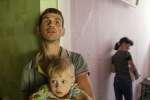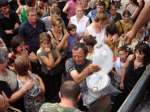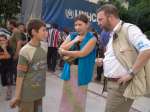Russia speeds up asylum procedures as Ukrainian influx continues
News Stories, 21 August 2014
ST. PETERSBURG, Russian Federation, August 21 (UNHCR) – Before Ukraine's secession crisis erupted in February, the Federal Migration Service office in St. Petersburg handled 120 asylum applications a year, mainly from Asians and Africans.
Today, Ukrainians are arriving in the Russian city at a rate of 300 a day, according to the regional branch here of the Russian Red Cross, which has been working hard to provide assistance and help find shelter for those who need it.
Natalia,* one of the tens of thousands of Ukrainians who have found their way to Russia's second largest city from eastern Ukraine, said she had been staying with friends, like many others. "Now their own relatives are arriving, so we have to move out and find a new place," she explained to UNHCR.
But the influx is having a positive effect on the asylum process, and that is good for the Ukrainians. UNHCR hopes asylum-seekers from other countries in Central Asia, the Middle East and Africa will also benefit. Recent legal changes allow for a simpler and faster asylum procedure for processing Ukrainians and for medical screening.
New arrivals from Ukraine apply for temporary asylum, a status that is usually granted within a few days and allows them to stay in the Russian Federation and receive assistance.
Many seem ready to remain here and have started looking for employment and putting down roots. Natalia has been lucky; her husband has found work as a technician and is waiting for his first salary payment. They have been spending time in a shelter since leaving the friend's house and are now looking for a place to rent.
Life is tougher for many others, but the St. Petersburg Red Cross branch, which has had a long cooperation with UNHCR on refugee issues, has been working closely with the Federal Migration Service, the municipality and potential employers to help the neediest Ukrainians.
The Red Cross runs a short-term emergency shelter for hardship cases, where Natalia and her husband have been staying. The regional branch is also providing legal and social counselling and is running a nationwide hotline for all refugees, Ukrainians or not.
Their most recent initiative is a day-care centre where Ukrainian parents can leave their children while they are running chores, getting documents or looking for employment. "These children are as traumatized as their parents and it does not help if they have to stand in queues for hours in this summer heat," said Tatiana Lineva of the Red Cross branch.
The influx of Ukrainians has also helped to raise public awareness in St. Petersburg about refugee issues and triggered a wave of solidarity in the city, including offers of shelter and donations of useful items. Some have also been donating their time as volunteer helpers.
UNHCR and the Red Cross in St. Petersburg hope this wave of sympathy will also benefit non-Ukrainian asylum-seekers and ease their difficult situation as well as facilitate their access to legal status and social support.
For most of the Ukrainian arrivals in St. Petersburg, returning to Ukraine does not seem to be on the cards. "Our own army has been shelling us. We do not want to go back if they take control," said Natalia, echoing the thoughts of others.
She and others stay in touch with friends and relatives in the Ukraine through the social media network Vkontakte. Natalia is in contact with people in her home town of Slovyansk, which is slowly emerging from conflict. But she won't return any time soon.
* Name changed for protection reasons.
By Melita H. Sunjic in St. Petersburg, Russian Federation












































